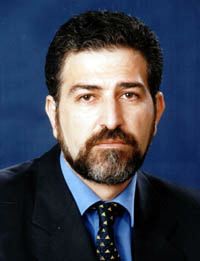 |
| Vol. 3 No. 4 | Table of Contents MEIB Main Page | April 2001 |
 |
| Samir Kassir |
On March 28, internal security forces at Beirut International Airport seized the passport of Al-Nahar journalist Samir Kassir upon his return to the country from Amman, where he was covering the Arab summit meeting. According to Kassir, General Security Directorate (GSD) personnel explained that they needed to "verify the conditions in which the passport was obtained." Kassir, whose parents are naturalized Palestinians [correction, 27 April: Kassir's family was originally Lebanese; his parents returned to the country and regained Lebanese nationality prior to his birth], obtained the passport in 1991, renewed it in 1997, and traveled overseas with it fourteen times last year without encountering any difficulties. The seizure was apparently meant to convey the threat that his citizenship may be revoked if he does not halt his outspoken criticism of the security services.
Kassir quoted GSD personnel at the airport as saying to him: "If you want, you can go to the [GSD] headquarters, and maybe they can explain to you the difference between General Security and private security."1 This was clearly a reference to the front-page editorial he wrote on March 16 criticizing the GSD for surrounding the offices of LBCI television for three days during a dispute between political elites who hold shares in the station. He referred to the GSD as "private security" in this article.2
Kassir said that he was under GSD surveillance prior to the confiscation of his passport. On March 19, residents living near Kassir's apartment reported being "interrogated" by security officers. On March 24, just prior to his departure for Amman, Kassir says he was followed continuously by unmarked cars.
This is not the first time that Kassir has run afoul of the GSD. Early last year, he received a phone call from the director of the GSD, Gen. Jamil Al-Sayyid, a close ally of the Syrian regime. According to Kassir, Sayyid threatened him for writing an article in which he criticized the security services for failing to prevent clashes between the army and Islamist militants in north Lebanon.
Reaction
Reaction to this incident within the Lebanese government illustrated the extent to which the GSD, which takes orders directly from Syria, is operating without the knowledge or consent of Prime Minister Rafiq Hariri and many members of his cabinet. On March 29, Information Minister Ghazi Aridi said that he was "against any illegal measures taken against any journalist, whether or not it's Samir Kassir, despite the issues that a given journalist might raise."2
The GSD immediately released a statement in response to Aridi, saying that it "does not need lessons in democracy from people who have showed in the past that they have an anti-democratic attitude," referring to the civil war era past of Walid Jumblatt's Progressive Socialist Party, of which Aridi is a member.3
Hariri publicly invited Kassir to have dinner with him, a move which even the relatively pro-Syrian newspaper Al-Safir criticized as insufficient in an editorial. "Hariri found nothing better . . . than to show his disapproval of the harassment to which the head of the GSD is subjecting the journalist," wrote Ibrahim Al-Amine in an Al-Safir editorial earlier this month. "He appears like an opposition leader who does not want to confront government agencies. He seems to have forgotten his duties as prime minister."4
The harassment of Kassir was widely condemned by all sectors of Lebanese civil society. Students at Universite Saint Joseph held a sit-in to express solidarity with the beleaguered journalist. Several opposition groups on the Internet circulated petitions demanding the return of his passport. The Lebanese representative of Nouveaux Droits de l'Homme, Dr. Elie Abou Aoun, called on the government to "immediately cease its intimidation of Mr. Kassir" and "identify those responsible for the arbitrary security measures taken against him."
In a letter to Interior Minister Elias Murr, the Paris-based watchdog group Reporters sans frontières requested that Murr "intervene with the concerned services so that the journalist's passport is returned" and "put a stop to the shadowing" of Kassir by the GSD. The letter added: "It is worrying to see that the Lebanese authorities are now resorting to this kind of practice to intimidate an accredited journalist."5 The Committee to Protect Journalists called on the government to "cease its unjustified harassment" of Kassir.6
On April 9, the GSD announced that it would return Kassir's passport, pending further legal verification of the document. The GSD statement said that a preliminary investigation proved that the "principal document upon which he had obtained Lebanese nationality is missing from civil status departments and judicial archives." The return of his passport would only be temporary, said the statement, pending "the end of the legal investigation or the presentation by Kassir of the missing document."7
This is not the first time that the GSD has revoked the passport of a troublesome journalist. In June 2000, security forces seized the passport of Raghida Dergham, the New York bureau chief for the London-based daily Al-Hayat, who had written critically of the government's refusal to acknowledge the UN's demarcation of the Israeli-Lebanese border. The next day, the GSD annulled her passport and instructed Lebanese embassies and consulates abroad not to renew it. The GSD later stated that Dergham had violated Lebanese law, which forbids contacts with Israeli citizens, by participating in a May 19 panel discussion in Washington DC that included Uri Lubrani, the Israeli coordinator for south Lebanon. After protests by the Committee to Protect Journalists and other international human rights groups, President Emile Lahoud reversed the order on July 17.
Notes
1 Al-Nahar (Beirut), 30 March 2001.
2 The Daily Star (Beirut), 30 March 2001.
3 AFP, 31 March 2001.
4 Al-Safir (Beirut), 9 April 2001.
5 Reporters sans frontières, Press Release, 30 March 2001.
6 The Committee to Protect Journalists, Open Letter to Lebanese President Emile Lahoud, 12 April 2001.
7 The Daily Star (Beirut), 10 April 2001.